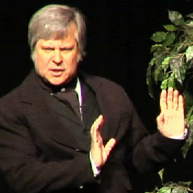Presentations for Reading Teachers
Keynote: Why Tell Stories: The Magic and Methodology of Storytelling
The latest educational research affirms what storytellers have always known: oral language development is the key to reading and writing. In a manner of thinking, storytelling is the cornerstone for integrating science, math and history; storytelling is encoded in our DNA. In this mix of audience participation storytelling and academic research, listeners will walk away with a few new stories to tell, but more importantly they will gain a solid theoretical foundation for nourishing our work.
Related Workshops:
Playing With Genre: Using Oral Language Skills to Improve Reading and Writing Improving writing scores and reading skills is really about teaching thinking. In this participatory workshop, you will use oral language to initiate writing in several genres including poetry, persuasive, narrative, and expository writing. We will engage in lively persuasive debate, tell personal stories and essay important ideas.
Bird Is The Word: Journaling, Poetry, Non-Fiction Writing, and Ornithology A poet’s eye and gift for language is very similar to the detailed observation and ability to communicate complex ideas required of field ecologists. In this participatory workshop you will learn some tips for effective journaling. You will learn to use haiku to focus your eye and ear. You will learn to use poetry to help you write clearer, more exciting essays and turn your field notes into publishable articles. Come to celebrate the voices of nature and find your voice in the natural world.
Content Area Reading Storytelling: His-story, Her-Story, Science and Math Stories - Improving basic literacy, reading and writing test scores, by integrating the curriculum is the aim of this participatory workshop. Stories can become the warp upon which a teacher weaves the threads of the various content areas. We listen and speak at a higher level than we can read and write, so it is only natural to use storytelling and listening to teach content. And oral language development is the cornerstone for better reading and writing.
Brian “Fox” Ellis is a former elementary school teacher and reading specialist who has worked extensively with Chapter 1 and Reading Recovery programs developing family literacy initiatives. He is the author of 16 books including the critically acclaimed children’s picture book The Web at Dragonfly Pond, (DAWN Publications, 2006) and his latest book for teachers, Content Area Reading, Writing and Storytelling (Teacher Ideas Press 2010).





